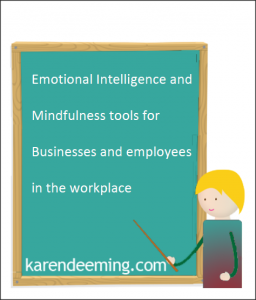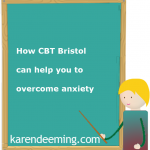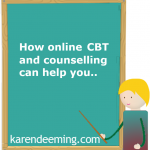
In response to Coronavirus (Covid-19), I am offering telephone, online counselling and CBT sessions via Zoom and WhatsApp.
New Mindset new work opportunities…
Does any of this sound like you?
- I want to reconnect with my creativity, spark and imagination but don’t know how
- Instead of feeling demotivated and bored at times, I want to feel more focused, passionate and enthusiastic about my work
- I’d like to achieve even greater success levels in work and relationships
- I want to become more productive, to procrastinate less, to make smarter use of my time and to consistently meet/exceed my targets
- Making it to the top of my career is a key priority for me
- I’d like to enhance my leadership skills, to improve my communication style, to read people more efficiently and to become more emotionally intelligent
- Obstacles keep holding me back because I’m afraid of not having what it takes to be successful or to follow my ideal career path
- I’d like to be more decisive
Well the good news is you are not alone in this, we all feel at least one of these things sometimes…
Even more good news, Mindfulness and emotional intelligence strategies and tools can really help you to overcome stress, burn out and to develop new/improved business skills too such as –
- Improved work performance and targets
- Wiser Decision making
- Resilience
- Patience
- Mental Focus
- Improved People and Social skills
- Creativity
- Skilful Communication
- Embodied Leadership
- Confidence
- Empathy and compassion
- General well-being
- Ability to perform better under pressure
Bringing Mindfulness and Emotional Intelligence to the Workplace
Google is, by all accounts (it was named Fortune’s top great place to work in 2014), a world-class employer. The organisation prides itself on being socially conscious, offering employees (known as Googlers) substantial benefits and perks like on-site cafes, dry cleaners, nap pods, and more than a dozen mindfulness courses. Google’s most popular “Search Inside Yourself” mindfulness course, offered since 2007, has a six-month wait list and thousands of Googler alumni.
The program consists of 19 sessions or an intensive two-and-a-half day retreat, and is designed as a contemplative training program that helps participants learn to better relate to themselves and to others. The training consists of three parts: attention training, self-knowledge development, and “creating mental habits.” Attention training focuses on developing the ability to bring one’s mind, under any circumstance and at any time, to a place that is calm and clear. Self-knowledge development focuses on becoming more aware of one’s self, creating a quality of self-knowledge and self-awareness that improves over time.
This self-awareness helps mindfulness practitioners master their emotions. The third part of the training focuses on creating mental habits – for example, creating a mental habit of kindness. Participants are taught to look at every person they encounter and think “I want this person to be happy.” Once it becomes a mental habit, kindness comes naturally (Baer, 2014).
Google says this and other mindfulness programs are good for the company because they teach emotional intelligence, which helps people better understand their colleagues’ motivations. It also boosts resilience to stress and improves mental focus (Baer, n.d.). Participants of the “Search Inside Yourself” program agree. They report being calmer, more patient, and better able to listen. They also say the program helped them better handle stress and defuse emotions (Kelly 2012).
Healthcare giant Aetna liked the outcome of their study on mindfulness so much they now offer their mindfulness programs to customers, and more than 3,500 employees have participated in the programs.
In 2010, Aetna developed, launched, and studied two mindfulness programs—Viniyoga Stress Reduction and Mindfulness at Work—in collaboration with Duke University, eMindful, and the American Viniyoga Institute.
The goals of the programs were to help reduce stress and to improve how participants react to stress (Gelles, 2012 and Aetna staff, 2012).
In today’s work environment, mindfulness and emotional intelligence are personal and professional strategies to improve performance and productivity.
As Google, Aetna, General Mills, and Target can attest, bringing mindfulness and emotional intelligence to their workplaces has decreased employees’ stress levels, improved their focus and clarity, improved their listening , decision-making and leadership skills, and improved their overall happiness and well-being.
Perhaps most importantly from an HR and talent management professional perspective, mindfulness can reduce employee absenteeism and turnover, improve employee and client relationships, and boost job satisfaction.
So, what’s the cost of leading a hectic lifestyle to our health and well-being without mindfulness and emotional intelligence strategies?
It can be exciting and thrilling pushing ourselves to and often beyond the limits of how much we are capable of. That said, doing too much too quickly can be exhausting, uncalled for, and potentially dangerous, for example, phone calls whilst driving.
In our relentless overloaded world, we often feel depleted and more tired when we get up in the morning than when we go to bed. Our productivity levels and the quality of our work depreciates with speed. The quicker we approach tasks the more likely we are inclined to make errors. When we feel up and high, we ride our hectic life like a high performing surfer in the flow of a great wave, but when we’re down often we wipe out, burn ourselves out and can’t seem to overcome exhaustion. Most importantly though this has long lasting and detrimental consequences for our health and well being such as high blood pressure, fragile immune systems and chronic fatigue syndrome.
What can you do about it?
Over the next few weeks, I’ll be sharing with you the mindfulness, emotional intelligence self help and personal development techniques and tools that helped me to:
- fulfil my dream of escaping the corporate cage, that is, my well-paid secure job and hectic lifestyle in London
- move from London to live in the idylic countryside and do my dream job as a successful Psychotherapist, Coach and Mindfulness Teacher helping 1000s of clients at my Liverpool Street and Harley Street Practices and nowadays at my online, Bristol and Somerset Practices sometimes advising film Directors, such as Mike Leigh, on the authenticity of film narratives.
Though I am now doing my dream job, living in a delightful Somerset village and have many tools at my disposal, life is occasionally still tough so I’ll also send you some tips to help you remain motivated, and focused when you are feeling stuck, overwhelmed, lost or you are falling victim to ”l’m too busy and don’t have enough time” and procrastination trap.
Tip Two: How mindfulness and emotional intelligence can help you to develop more confidence at work
Walk away from your desk and imagine you are pressing the pause button of a film entitled: “My work life”
Then, physically step to the right and ask yourself the following questions:
Why am I feeling under confident?
For me, the most important first step when confidence building is to ask yourself whether you are demonstrating the behaviours and are following the beliefs outlined in the quotes below
One “Life is too short to be spending it with the wrong people”
Two “Surround yourself with the dreamers and the doers, the believers and thinkers but most of all surround yourself with those who see greatness within you, even when you don’t see it yourself”
Three “Surround yourself with people who champion and encourage you to do new things and who bring out the best in you not the stress in you”
Four “If you do please everyone you are not making progress”
If your answer is no, then start doing so now otherwise you may continue to talk yourself out of doing incredible things forever because you’re afraid you’ve got what it takes. This can often happen especially when you share new ideas or ventures with the naysayers in the world.
You know who I mean, those people who say:
“you don’t want to do that it’s too risky”
“you don’t have the skills”
“you’ll never make it as a successful artist or author that’s for dreamers”
They also regularly use phrases such as
“yes but”
“what if”
“should”
“have you thought about”
ETC ETC you get the gist?
Also, remember that these alleged “naysayers” are often concerned and envious that if you make it to the top of your career or you become a highly successful entrepreneur, this might highlight their own fears insecurities and inadequacies. So watch out, they will try all kinds of strategies to hold you back just in case: “you get too big for your boots” or “who do you think you are”
In other words “success breeds envy”
An excellent Coach, Lynne Paris, I once worked with coined a delightful phrase for this type of behaviour: “The Cinderella Syndrome” Lynne was an expert naysayer spotter as she encountered hundreds of naysayers when she wrote a play shown in London at age 62. Good for her !!!
And how about J K Rowling? Before she became a famous Harry Potter author she was continually criticised by people close to her for having an over active imagination.
Anyhow let’s back to the Cinderella syndrome what Lynne meant by this was: the higher you excel at work, in business or in your personal life the more ugly sisters you will attract.
(Though I am using the word “sister” in this context I am actually referring to both males and females because it’s rife in both genders).
Put simply, no matter what you do and how well you do it, there will always be someone there to rain on your red carpet, so it’s important to know how to spot these so called ugly sisters:
They often display envy when you achieve success, then deny it, and express negativity towards you and your accomplishments.
They look for the smallest mistake, then attack, never acknowledging any of the positives.
They’re critical of absolutely everything, are insecure, under confident really even though they often present an assertive and confident facade and are unhappy with themselves to say the least
And most significantly they are ENVIOUS OF YOU
Here’s some tips how to deal with these ugly sisters and become more confident
One I – ignore them
I appreciate that this is easier said than done what can be helpful as a first step though is begin to ask yourself what do I know?
I know that their criticism adds no value to my life, if I believe what they say to me, I may end up stuck where I am and not being the best possible version of me to fulfil my dreams and passions
I also know that it’s important to accept that ugly sisters will always exist because it’s their occupation and I cannot change this.
Two – don’t take it to heart
Occasionally, you may experience difficulties identifying constructive criticism and ugly sister behaviour because there may be a grain of truth in their remarks. If this is the case, remind yourself thoughts and opinions are not facts just someone’s version and perception of the world based on their past experiences.
Three – avoid counter attacking
This takes up too much time and energy and life’s too short, so don’t give these ugly sisters the satisfaction of getting what they want, ie your attention, they don’t deserve it. Also it this type of behaviour only brings you down to their level and that’s unseemly.
Four – Dodge apologising and overusing the word sorry
It’s not unreasonable for you to expect other people to treat you as an equal with respect and dignity and in the manner that they would expect to be treated.
Apologising and using the word sorry regularly is highly likely to make people take you less seriously and as being somehow inferior to them.
At its worst, it can lower your confidence levels so hold on to your hard earned self respect, value and integrity. Only say sorry when it is appropriate for example when you make a mistake or when you accidentally bump into someone on the train.
Five – Stop people pleasing
According to Psychologist Susan Newman People-pleasers “want everyone around them to be happy and they will do whatever is asked of them to” keep it that way.”
Often, even if it means abandoning their own needs to meet the needs of others.
People pleasers yearn for outside validation. Their “personal feeling of security and self-confidence is based on getting the approval of others,” said Psychologist Linda Tillman.Thus, at the core, people-pleasers lack confidence, she said.
As stated earlier – “If you do please everyone you are not making progress”
Worst case scenerio – when you’re walking on eggshells trying to please everyone, it’s impossible to be the best you can be and indeed to be yourself.
So is it worth it? No because you end up bending yourself out of your true shape and continually feel resentful and disappointed because of all the sacrifices you are constantly making.
Six – Allow yourself to feel flattered
If people are continually undermining or putting you down know that you are a star shining brightly and that it is a form of confirmation you are doing something right or that matters.
So, treat how they are behaving towards you as a compliment and remember you wouldn’t know how successful you are if it wasn’t for your entourage of ugly sisters.
I’ll end with one of my favourite quotes by Fritz Perls Pioneer of Gestalt Therapy
I do my thing and you do your thing
I am not in this world to live up to your expectations
And you are not in this world to live up to mine
You are you and I am I
And if by chance we find each other it’s beautiful
If not it can’t be helped
Watch out for Tip Three in the next few weeks!!
You can book your appointment here or you can contact me on (044) +7950 751352 for outside the UK or 07950 751352 inside the UK. Alternatively by email: karen@karendeeming.com.



![Karen_Deeminga[1]](http://www.karendeeming.com/wp-content/uploads/2015/09/being-practice-self-portrait-e1541437891746.jpg) Welcome to my site. if you have any queries then please
Welcome to my site. if you have any queries then please

